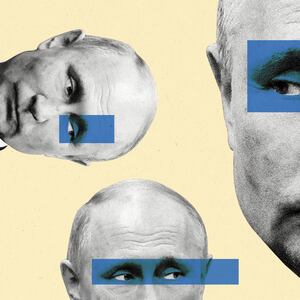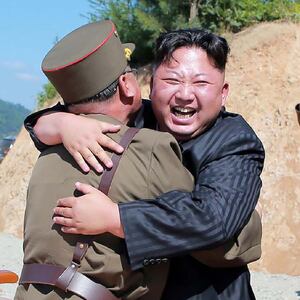SEOUL—The specter of U.S. troops in combat on the European mainland is a blessing for North Korea’s Kim Jong Un.
Washington’s preoccupation with Ukraine evokes the nightmare of wars on either side of the globe, and Kim seems pretty sure the U.S. is not about to risk that.
Not since World War II, when American forces battled Nazi Germany in Europe and imperial Japan in Asia, has the U.S. been so close to shooting wars in regions that are geographically so far apart against forces that are so menacing. In Europe, it’s the Russians whom the Americans are up against, and in Asia it’s the Chinese supporting the North Korean dictator as he orders missile tests at an unprecedentedly rapid clip while hinting at another nuclear test.
“The Biden team is way over its head, flailing and struggling,” Nicholas Eberstadt, long-time Korea-watcher at the American Enterprise Institute in Washington, D.C., told The Daily Beast. “Anyone can recognize that, including our friend in Pyongyang.”
Kim clearly stands to benefit from the growing antagonism between the U.S. and North Korea’s greatest benefactors, China and Russia. The U.S. “cannot engage in two wars at the same time,” Ahn Cheol-soo, a wealthy entrepreneur and third-party candidate in South Korea’s hotly contested presidential election in March, said in response to The Daily Beast’s question at the Seoul Foreign Correspondents Club. “The U.S. does not have sufficient resources.”
In a game of intimidation while his country writhes under the pandemic and sanctions placed by the U.S. and UN, Kim ordered seven missile tests off the east coast in January. On Sunday an intermediate-range shot, the strongest in four years, soared 2,000 kilometers before splashing down 500 kilometers from the launch site.
Pyongyang’s Korean Central News Agency said Monday the test “confirmed the accuracy, security and effectiveness” of the Hwasong 12 now “under production.” In the fifth and sixth tests last week, the North fired pairs of long-range cruise missiles and short-range models, said KCNA, to update the cruise system and confirm the power of conventional warheads.
Never before has North Korea conducted so many tests in a single month. The meaning is obvious: Kim is gearing up for the first test of an ICBM since November 2017 and the first of a nuclear warhead since the North exploded its sixth in September 2017.
Bruce Bechtol, author of books and studies on North Korea's leadership and armed forces, predicted, “North Korea is likely to test BOTH its nuclear weapons and to do test launches of ICBM's,” that is intercontinental ballistic missiles capable of carrying warheads to the U.S.
“The reasons are simple,” Bechtol told The Dail Beast. “These systems have recently been upgraded, but the Hwasong-14 has only been tested twice and the Hwasong-15 has only been tested once. Of course, these tests will also be timed to increase tensions and to push the USA/ROK (Republic of Korea, South Korea) into talks that Pyongyang wants to use to ease sanctions.
Evans Revere, former senior U.S. diplomat in Seoul and Washington, agreed. “U.S. relations with three key adversaries—Russia, China, and North Korea—are as bad as they have been for many years, and there's a serious prospect they will get even worse in the months to come,” he told The Daily Beast. “This begs the question of whether each of these three actors now sees an advantage to be gained because of the worsening ties between Washington and the other two.”
Moreover, Revere added, “It also gives rise to concern that there may be some cooperation or coordination between and among them designed to distract the United States as it faces multiple, simultaneous international challenges.”
On Thursday, China unequivocally supported Russia’s President Vladimir Putin by publicly announcing that Beijing’s foreign minister had told U.S. Secretary of State Antony Blinken that the “legitimate security concerns” of Russia should be “taken seriously.” Coincidentally, Kim and his younger sister, Kim Yo Jong, visited a munitions factory where Pyongyang’s Korean Central News Agency said Friday he admired “leaping progress in producing major weapons.”
Right now Kim is watching and waiting while revving up what he calls North Korea’s “defense” against U.S. invasion. As he told a meeting of the politburo of his ruling Workers’ Party, the time had come to consider “more thorough preparation” against “the U.S. imperialists” by “restarting temporarily suspended activities.”
With the U.S. placing 8,500 troops on alert to deploy to Europe and Biden threatening strong sanctions if Russia’s President Vladimir Putin invades Ukraine, Kim’s missile tests are a stark reminder of his potential to ignite a second Korean war. He would still need approval and support from China, just as his grandfather, Kim Il Sung, relied on China’s Mao Zedong to turn back U.S. and South Korean troops during the Korean War. The overwhelming difference between now and then, though, is the proliferation of nuclear weapons and North Korea’s success as the latest unacknowledged member of the nine-nation nuclear club—unacknowledged, that is, by the U.S., which refuses to see the North as a nuclear power.
The regions now threatened in Eastern Europe and Northeast Asia are far smaller than the vast territories over which U.S. forces ranged eight decades ago, but the danger exists of wider wars with weaponry far more advanced than in those dark days. The U.S. has 55,000 troops in Japan, mostly in Okinawa, and 28,500 in South Korea—not nearly enough to defend either country if war were to break out.
To Choi Jin-wook, president of the Center for Strategic and Cultural Studies in Seoul, “Ukraine tension clearly reduces the hope for any breakthrough on the North Korea issue.” As he told The Daily Beast, “Growing conflict between the U.S. and Russia will be another burden.” That’s on top of “rivalries between the U.S. and China,” said Choi, that “keep the U.S. from devoting itself to North Korea, both militarily and diplomatically.”
Intrinsic in the potential danger facing the U.S. in Northeast Asia is China’s persistence in claiming its right to rule Taiwan, the off-shore island redoubt to which forces under Chiang Kai-shek fled before the victory of Mao’s Red Army on the Chinese mainland in 1949. South Korea, under the liberal government of President Moon Jae-in, would not want U.S. troops in South Korea to rush to Taiwan’s defense. Nor would Moon be likely to commit South Korean troops to defending Taiwan while China could easily retaliate by encouraging North Korea to attack the South.
“The bigger concern is a China-Taiwan conflict that could involve the U.S.,” said Steve Tharp, who’s spent more than 40 years in Korea as an army officer and civilian official with US Forces Korea. “The U.S. needs regional alliance partners to effectively deal with these two and three simultaneous war scenarios. We can't do it alone without much more air and naval resources than the American taxpayers should be paying for.”
The timing is all the more propitious for Kim while South Korea is embroiled in a campaign for a new president in which the leading candidates take diametrically opposed views on dealing with him. The left-leaning Lee Jae-myung of the ruling Minjoo or Democratic Party calls for reconciliation and dialogue, playing down the historic U.S alliance and the need for military exercises with South Koreans; his conservative foe, Yoon Suk-yeol, says it’s time to “rebuild” ties with the U.S., at odds with the South’s on concluding an end-of-war agreement with the North.
“The North’s saber-rattling has posed an unsettling setback for Seoul striving to salvage its fragile peace drive,” said Yonhap, the South Korean news agency, with “Washington preoccupied with tensions between Russia and Ukraine, and Beijing setting the mood for its successful hosting of the Winter Olympics set to begin Friday.”
As Kim’s missile tests make clear, he’s eager to exploit divisions in the South as well as U.S. involvement in Ukraine. A sign of conflict between Washington and Seoul is that Biden has waited for more than a year to designate a new ambassador to South Korea as a successor to Harry Harris, a retired U.S. admiral who previously commanded U.S. forces in the Pacific and upset Moon’s administration by a hardline position on North Korea and the need for military exercises involving U.S. and South Korean troops.
Philip Goldberg, reportedly the ambassador-designate, who once aided in enforcing UN sanctions against North Korea and has served as ambassador to several countries, has yet to jump through the hoops of a hearing by the Senate Foreign Relations Committee and then get the approval of the full senate. That should be routine, but the Texas Republican Ted Cruz has been holding up appointments while demanding Biden pressure Germany not to let the Russians ship in natural gas via a new pipeline.
In the intersection of politics and diplomacy in Washington, Team Biden, waiting to see how the South Korean presidential election turns out, wasn’t too eager to get a new ambassador to South Korea before a new Korean president takes office. Washington and Seoul have long opposed South Korea’s call for an end-of-war agreement with North Korea that outgoing President Moon wants as his legacy. The new ambassador will have to walk a fine line delivering the message to the man who follows Moon, who can’t run for a second term under Korea’s constitution.
All of which adds to distractions over Ukraine and Taiwan that indeed give Kim the chance “to support his objective and strategy,” said David Maxwell, senior fellow at the Foundation for Defense of Democracies in Washington.
He’s “preparing for a warfighting campaign to be able to attack South Korea,” said Maxwell, a retired U.S. army officer who served five tours in the South with the special forces. Whatever Kim does, militarily or diplomatically, Maxwell told The Daily Beast, the goal is “to force U.S. forces from the peninsula” and “unify the peninsula by force.”
At the American Enterprise Institute, however, Nick Eberstadt said Kim might not go too much beyond rhetoric while struggling with COVID-19. “The North Korean regime has been all but incapacitated by the pandemic,” he said. “We can be quite confident, when the regime recovers, we’ll see a more aggressive stance from Pyongyang.”
As for Team Biden, Eberstadt said that “they have so little bandwidth, they’re deferring the problem of the Korean peninsula.”








